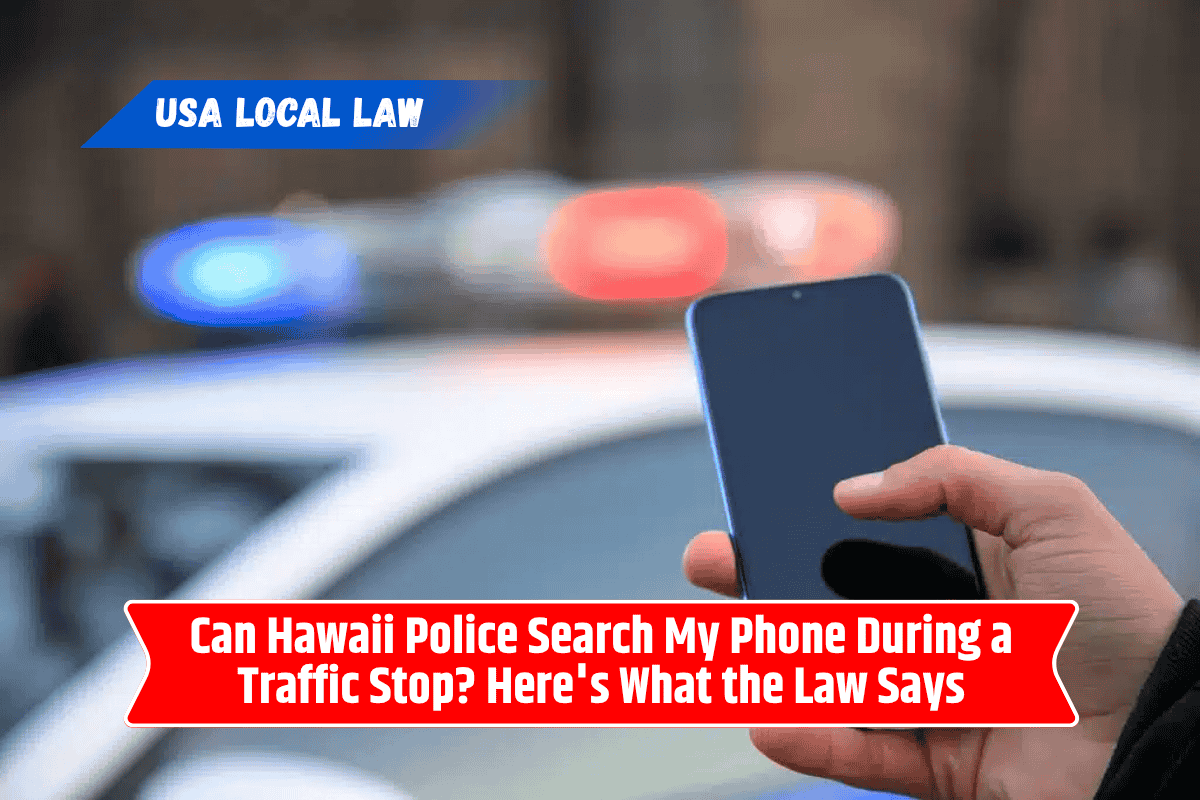Being stopped by the police can be stressful, and questions about your rights often arise during these encounters. One common concern is whether police can search your phone during a traffic stop in Hawaii.
In today’s digital age, cell phones hold a lot of personal information, and it’s natural to wonder what the law says about police searches of your phone. Here’s a breakdown of Hawaii’s laws and what you need to know.
The Fourth Amendment and Your Rights
Under the Fourth Amendment of the U.S. Constitution, you are protected from unreasonable searches and seizures. This means that the police cannot search you or your belongings without a valid reason or a warrant in most cases.
However, there are exceptions to this general rule, especially during traffic stops, when police have the right to search under certain circumstances.
Can Police Search Your Phone Without a Warrant in Hawaii?
In general, police cannot search your phone during a traffic stop in Hawaii without a warrant. The U.S. Supreme Court’s 2014 ruling in Riley v. California established that police need a warrant to search the digital contents of a cell phone.
This decision was based on the fact that modern phones contain vast amounts of personal information, making them different from other physical items in your possession.
However, there are some situations where police might be allowed to search your phone without a warrant, though these are more limited. These exceptions generally fall under the “exigent circumstances” rule, which allows police to act quickly if they believe there is an emergency or if evidence may be lost or destroyed.
When Can Police Search Your Phone Without a Warrant?
- Consent
If you give police consent to search your phone, they can do so without a warrant. If you are asked and you agree, you are waiving your Fourth Amendment rights, and the search will be considered legal. However, you have the right to refuse, and it’s important to remember that police must respect your decision if you say no. - Exigent Circumstances
If there is an urgent situation, such as an immediate threat to safety or the risk that evidence could be destroyed, police may be able to search your phone without a warrant.
For example, if the police believe your phone has evidence of a crime that could be deleted remotely, they might argue that they need to search it immediately to preserve the evidence. - Arrest and Search Incident to Arrest
If you are arrested, police may search your phone as part of a search incident to arrest. However, the search must be limited to ensuring there are no weapons or immediate threats. A broader search of the phone’s contents still typically requires a warrant. - Investigation of a Serious Crime
In rare cases, if police have reason to believe your phone contains evidence related to a serious crime (such as drug trafficking or a violent crime), they may attempt to seize the phone and get a warrant to search it later.
But even in these cases, they can’t just browse through your phone on a whim; a judge must approve the search.
What Should You Do if the Police Ask to Search Your Phone?
If a police officer asks to search your phone, you have the right to refuse without facing immediate legal consequences. Politely and clearly stating that you do not consent to the search can protect your rights. If the officer insists, they would typically need a warrant to continue.
It’s important to stay calm and composed during these interactions. If you refuse the search, the officer may take your phone and seek a warrant, but they cannot force you to unlock the device without your permission or a court order.
What Happens If Police Search Your Phone Without a Warrant?
If the police search your phone without your consent, and there are no exceptions that justify the search (such as exigent circumstances), the evidence obtained may be inadmissible in court. This means that if your phone is searched illegally, any information or evidence found could be excluded from legal proceedings.
If you believe your rights were violated, you can challenge the search in court. An attorney can help you file a motion to suppress evidence obtained through an illegal search. This is a critical part of your defense if you’re facing charges where the phone’s contents are being used as evidence.
In Hawaii, police cannot search your phone during a traffic stop without a warrant unless specific exceptions apply, such as your consent or an emergency situation. It’s important to know your rights and remember that you are allowed to refuse a phone search unless there’s a valid legal reason.
If you believe your phone has been searched unlawfully, you have the right to challenge it in court, and an attorney can assist in protecting your rights. Staying informed about the law ensures that your privacy is respected during interactions with law enforcement.
